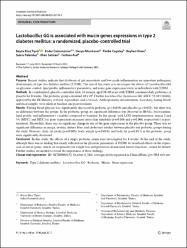| dc.contributor.author | Tipici, Beyza Eliuz | |
| dc.contributor.author | Coskunpinar, Ender | |
| dc.contributor.author | Altunkanat, Derya | |
| dc.contributor.author | Cagatay, Penbe | |
| dc.date.accessioned | 2023-05-02T11:04:48Z | |
| dc.date.available | 2023-05-02T11:04:48Z | |
| dc.date.issued | 2023 | en_US |
| dc.identifier.citation | Tipici, B. E., Coskunpinar, E., Altunkanat, D., Cagatay, P., Omer, B., Palanduz, S., ... & Aral, F. Lactobacillus GG is associated with mucin genes expressions in type 2 diabetes mellitus: a randomized, placebo-controlled trial. European journal of nutrition. | en_US |
| dc.identifier.issn | 1436-6207 | |
| dc.identifier.uri | https://doi.org/10.1007/s00394-023-03139-3 | |
| dc.identifier.uri | https://hdl.handle.net/20.500.12294/3809 | |
| dc.description.abstract | Purpose Recent studies indicate that dysbiosis of gut microbiota and low-grade infammation are important pathogenic
determinants of type two diabetes mellitus (T2DM). The aim of this study is to investigate the efects of Lactobacillus GG
on glycemic control, lipid profle, infammatory parameters, and some gene expression levels in individuals with T2DM.
Methods In a randomized, placebo-controlled trial, 34 women, aged 30–60 years with T2DM consumed daily probiotics or
placebo for 8 weeks. The probiotic group consumed 10× 109
Cfu/day Lactobacillus rhamnosus GG ATCC 53,103 (LGG),
approved by the TR Ministry of Food, Agriculture, and Livestock. Anthropometric measurements, food diary, fasting blood,
and fecal samples were taken at baseline and post-treatment.
Results Fasting blood glucose was signifcantly decreased in probiotic (p=0.049) and placebo (p=0.028), but there was
no diference between the groups. In the probiotic group, no signifcant diference was observed in HbA1c, fructosamine,
lipid profle, and infammatory variables compared to baseline. In this group, with LGG supplementation, mucin 2 and
3A (MUC2 and MUC3A) gene expressions increased more than ninefolds (p=0.046 and p=0.008, respectively) at posttreatment. Meanwhile, there was no signifcant change in any of the gene expressions in the placebo group. There was no
signifcant diference in energy, protein, dietary fber, and cholesterol intakes between placebo and probiotic groups during
the study. However, daily fat intake (p=0.003), body weight (p=0.014), and body fat (p=0.015) in the probiotic group
were signifcantly decreased.
Conclusion In this study, the efects of a single probiotic strain were investigated for 8 weeks. At the end of the study,
although there was no fnding that clearly refected on the glycemic parameters of T2DM, its benefcial efects on the expression of mucin genes, which are responsible for weight loss and protection of intestinal barrier functions, cannot be denied.
Further studies are needed to reveal the importance of these fndings.
Clinical trial registration ID: NCT05066152, October 4, 2021 retrospectively registered in ClinicalTrials.gov PRS web site. | en_US |
| dc.language.iso | eng | en_US |
| dc.publisher | SPRINGER HEIDELBERG | en_US |
| dc.relation.ispartof | EUROPEAN JOURNAL OF NUTRITION | en_US |
| dc.identifier.doi | 10.1007/s00394-023-03139-3 | en_US |
| dc.rights | info:eu-repo/semantics/openAccess | en_US |
| dc.subject | Type 2 Diabetes Mellitus | en_US |
| dc.subject | Lactobacillus GG | en_US |
| dc.subject | Probiotic | en_US |
| dc.subject | Mucin | en_US |
| dc.subject | Gene Expression | en_US |
| dc.title | Lactobacillus GG is associated with mucin genes expressions in type 2 diabetes mellitus: a randomized, placebo-controlled trial | en_US |
| dc.type | article | en_US |
| dc.department | Tıp Fakültesi, Temel Tıp Bilimleri Bölümü | en_US |
| dc.authorid | 0000-0002-0058-4152 | en_US |
| dc.relation.publicationcategory | Makale - Uluslararası Hakemli Dergi - Kurum Öğretim Elemanı | en_US |
| dc.institutionauthor | Cagatay, Penbe | |
| dc.authorwosid | EOF-8364-2022 | en_US |
| dc.identifier.wosquality | Q2 | en_US |
| dc.identifier.wos | WOS:000960157700001 | en_US |


















